5 Differences Between Document Management and Contract Management in 2025
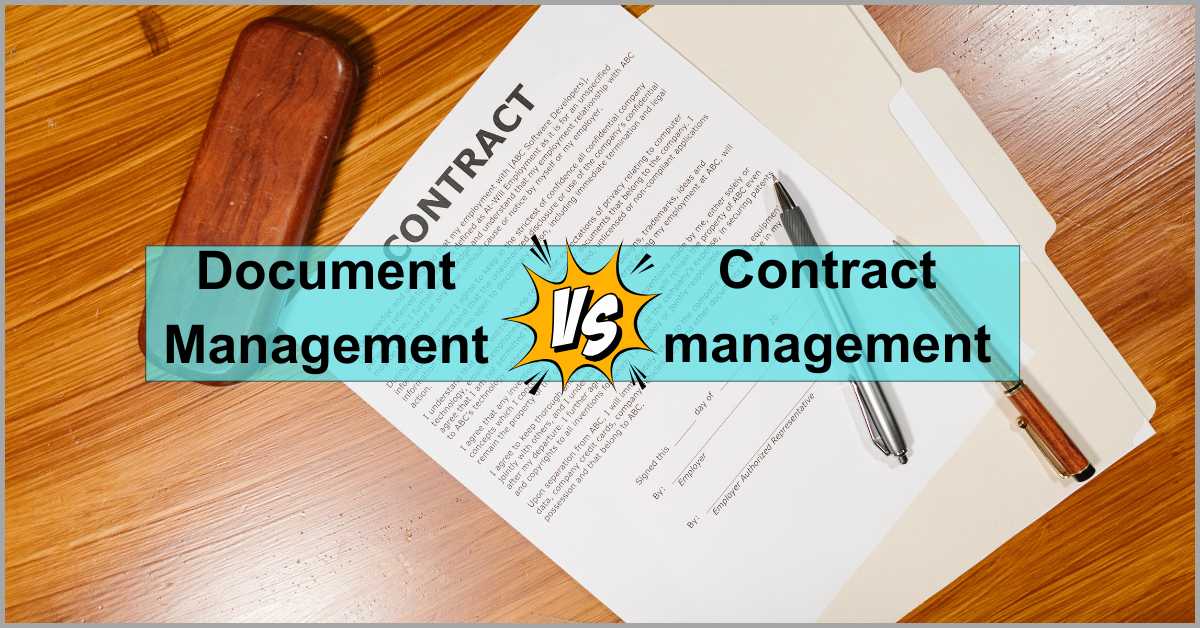
How does document and contract management differ?
In order to choose the right document management tool, it’s vital to understand both.
If you have a poor grasp of document and contract management processes, you may choose technologies that don’t fully address your small business’s needs.
A Capterra survey revealed 57% of businesses regretted software purchases made in 2024. Unclear expectations are significantly to blame.
It’s partly for this reason that I’ve rounded up some important document management vs contract management differences for us to explore. With this information, you’ll be able to identify your needs and choose a suitable information handling strategy.
This discussion will also help us understand what document management and contract management tools offer so you can determine the right fit for your small business.
If you’d like to improve your financial management processes, check out this article I wrote about the best invoice scanning software to improve cashflow.
In this article, we’ll discuss the major differences between document management and contract management in 2025 to help you improve your document workflow.
Let’s get started.
What is document management?
Document management is an important practice.
It generally refers to the process of organizing, storing, and generally managing both physical or digital documents, and it’s very useful for the efficient handling of both structured and unstructured data.
When document management is effective, your small business can solve information accessibility challenges that often hinder collaboration.
That said, your document management processes are only as effective as the tools you use. This is why I recommend using our proven platform, which offers vital features to help you improve various core aspects of your document management strategy.
If you’re ready to bolster productivity, start your free FileCenter trial to take our proven document management software for a spin.
You’ll get to explore important document management and contract management features, which can help you increase efficiency and jumpstart business growth.
What is contract management?
Just what is contract management & why does it matter?
Contract management is the process of overseeing legally binding agreements, right from drafting to renewal or termination. So it primarily deals with structured data, marking a key document management vs contract management difference to note.
It’s an essential practice which enables you to monitor responsibilities & risks in contract, helping your small business to meet its regulatory and legal obligations.
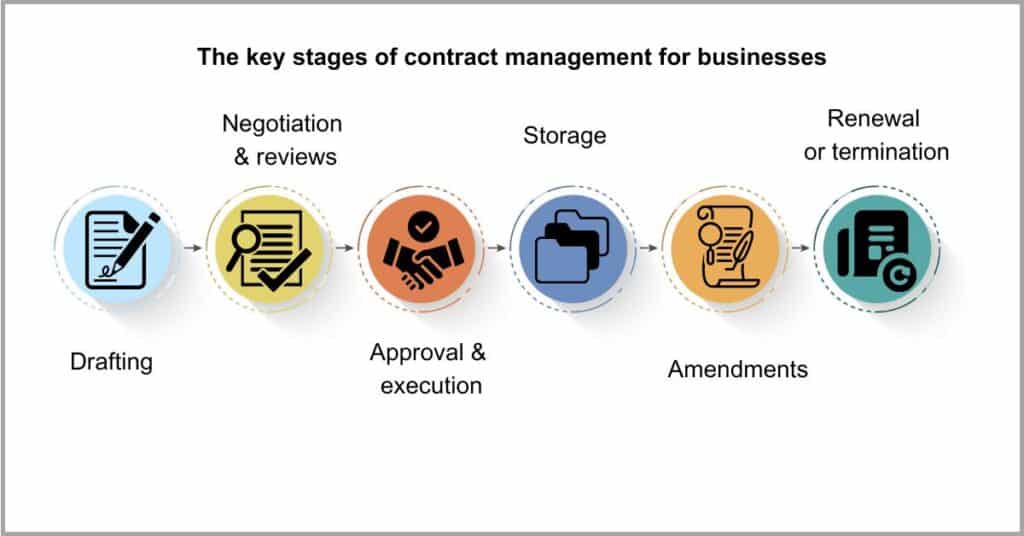
It may also involve the use of legal document management software, which may offer automated contract workflows and approval capabilities to increase efficiency.
With that in mind, effective contract management involves managing agreements through their lifecycles. It begins with contract drafting, followed by negotiation and reviews, approval & execution, amendments and, eventually, renewal or termination.
Some of the benefits of contract management include lower risks and stronger business relationships because of the efficient tracking of key dates, obligations and milestones.
Key differences between document and contract management
1. Documents
So what does contract management involve?
As far as the type of information that it handles, it generally offers a narrow focus on agreements and legally binding contracts. It’s a strategy that typically helps to track and manage these types of structured data to mitigate various risks.
When contract visibility is poor, your small business may incur massive financial losses because of missed cost savings and renegotiation opportunities.
The situation is severe with businesses losing up to 40% of a contract’s value due to value leakages stemming from poor contract visibility, according to a KPMG study. This emphasizes just how important efficient contract management is.
With a great strategy, you can increase the possibility of capturing the full value of every contract for your small business.
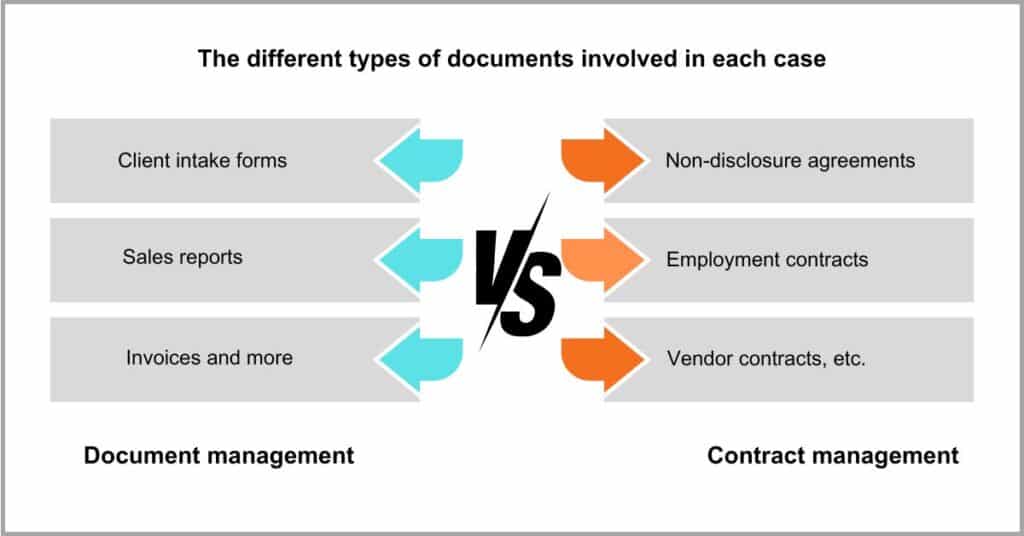
That said, document management has a much broader scope, and while it may also involve managing essential legal documents like contracts, it covers other general business files that your small business may come across.
These include everything from day-to-day business reports, change document processes, HR records, invoices and other types of unstructured data as well.
So this marks a key difference in our document management vs contract management debate, because it means that document management is focused on general documents while contract management is largely geared toward legal documents.
Some common types of files that contract management handles, on the other hand, typically include vendor contracts, client contracts, and employment contracts. It may also cover other information such as non-disclosure and service-level agreements.
2. Purpose
They also differ significantly in terms of purpose.
Starting with document management, the primary objective is usually to improve the way your businesses stores, tracks and organizes information. In fact, one of its top goals is to improve efficiency during file retrieval.
When document management isn’t great, your files may become very time-consuming to find, leading to productivity losses for your small business.
A recent survey by Gartner found out that 47% of digital workers struggle to find the information and data they need to do their jobs effectively. This has led many of them to make uninformed decisions or recreate files from scratch.
Aside from addressing these problems, document management also has a broader purpose that may include improving version control, data security and collaboration.
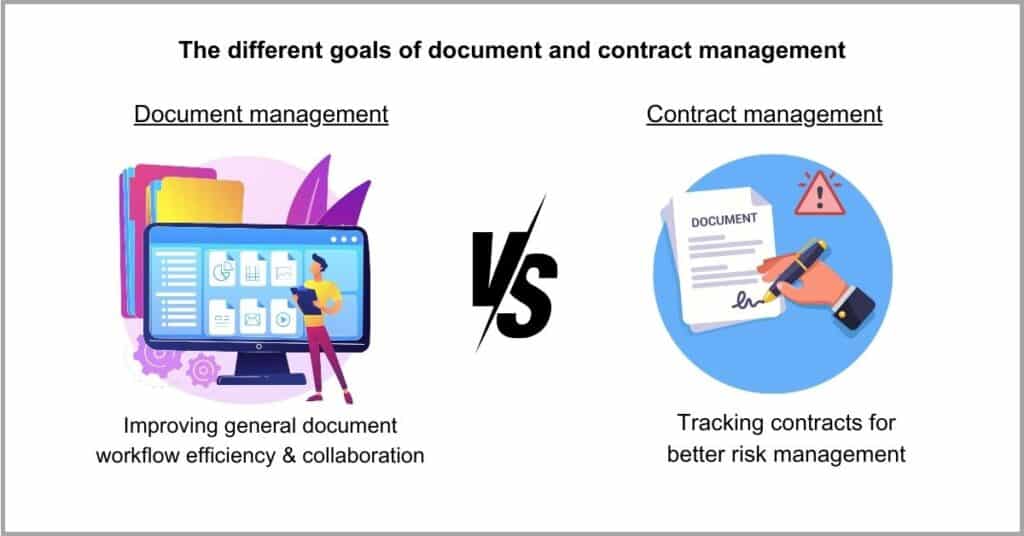
So what is the primary goal of contract management?
Of course, one of the key objectives is enhancing contract visibility to make these types of agreements easy to find. But the top goal is to oversee the entire lifecycle of contracts and agreements in order to mitigate risks and ensure legal compliance.
If you’d like to improve your contract management processes, a great document management software like ours can be instrumental.
So click here to start your free FileCenter trial to explore important contract management features that can help you streamline these processes.
For instance, you get the ability to create electronic signatures for quick turnaround time and more cost-efficiency signing processes. It also enables you to set automated document approval workflows to enhance contract reviews and boost productivity.
3. Technologies
How are they different in terms of tools?
Well, when it comes to document management, you’ll generally turn to a document management system (DMS). It enables you to manage general business files more efficiently, although there may still be a lot of manual processes involved.
With an excellent DMS, you can even digitize paper-based processes, enabling your small business to get around high storage and paper-related expenses.
A survey by Forrester showed that 37% of business leaders said the biggest benefit of digital document processes is reduced printing and storage costs. Beyond that, it can also help reduce document labor needs and scanning expenses.
The point is, however, document management ropes in a general-purpose software, which offers features that typically aren’t purpose-built for contract management.
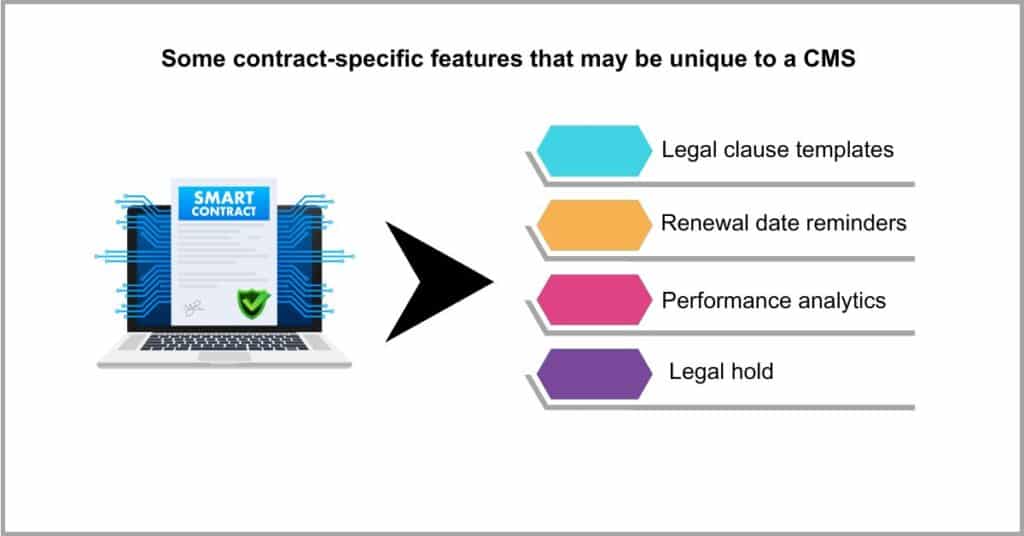
If your primary goal is contract management, I recommend a dedicated contract management system (CMS). This is specially geared toward the management of the lifecycle of contracts, and has features for contract execution, tracking and renewals.
It may even have automated approval features and workflows for various contract-related processes, to accelerate iterative tasks and increase your efficiency.
While some of the best small business document management software also double up as excellent CMS solutions, their features are usually geared toward content creation, retrieval, organization and general file management at large.
That said, it’s commonplace for features such as cloud storage, electronic signatures and workflow automation to overlap. However, a CMS may have contract-specific features that you may not find in a general-purpose document management system.
4. Lifecycle focus
A CMS usually tracks entire contract lifecycles.
Document management, however, is largely geared toward document organization, secure storage and access management but not necessarily file lifecycle tracking. This marks one of the key document management vs contract management differences.
That said, contract lifecycle tracking is crucial for your small business, because it helps to reduce the risk of unintended expirations, delays or automatic renewals.
A survey by DocuSign unearthed that 45% of contract management issues, particularly approval delays, result from poor document lifecycle tracking. With the right CMS solution, you can always stay on top of contract lifecycles with ease.
It may even give you real-time updates about the status of your contracts, enabling you to intervene in time to avert undesirable document events.
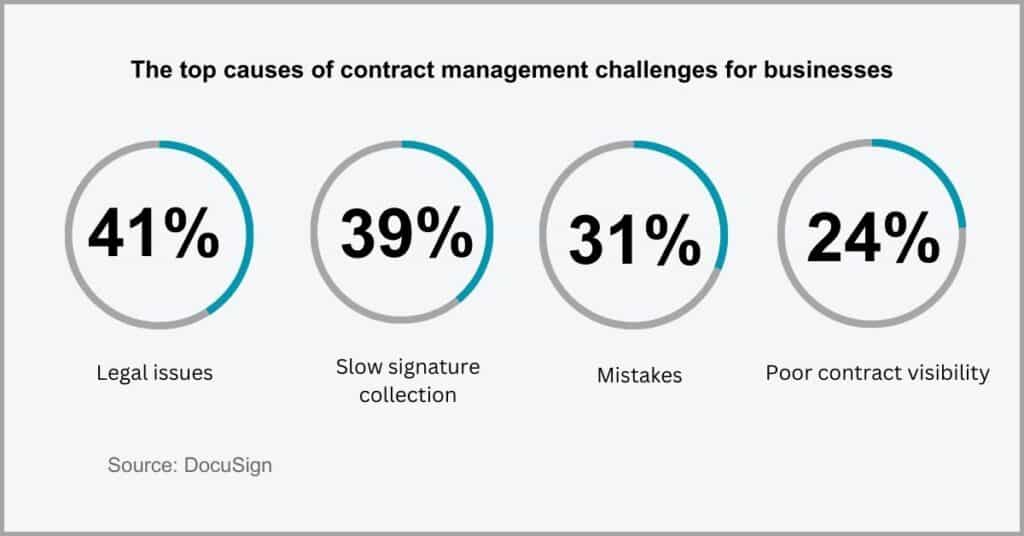
So contract management focuses on tracking the lifecycles of these types of documents and agreements to help you get full value from them. It covers stages like drafting, execution, performance monitoring and, ultimately, termination or renewals.
But what about document management?
We cannot say the same of document management and DMS tools, which typically either lack or have very limited document tracking capabilities.
Of course, I’ve seen some cloud-based document management software also support lifecycle management but this isn’t usually the norm. The primary purpose of these tools is typically to improve document organization, retrieval and storage.
It’s important to figure out if document or contract management is what you need, as per the specific types of documents you manage and your business’s legal obligations.
5. Analytics
Looking to improve your document processes?
Both document and contract management rope in various analytics and reporting, which reveal key insights that empower you to improve the performances of your document or contract workflow in different ways.
When you’re unable to extract key information from documents and contracts, your decision-making processes suffer due to poor business intelligence.
A survey by Wakefield showed that at least 71% of businesses make bad business decisions due to the lack of important analytics and data quality issues. This is why data-driven document and contract management becomes necessary.
However, with that being said, I’ve noticed distinct differences in terms of the statistics or KPIs that each of these processes generally tracks and focuses on.
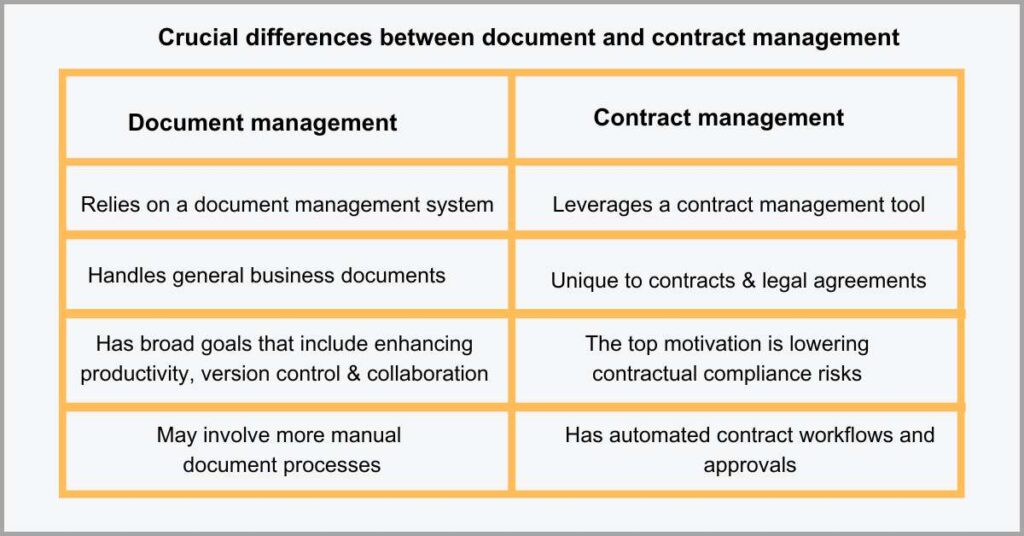
Starting with contract management and the tools used to manage this process, you’ll notice a key focus on contract analytics. These solutions may track contract data like obligation fulfillment, time-to execution, contract value and late-fee tracking.
Most notably, contract management also largely focuses on contract renewal & expiration analytics to prevent unwanted obligations from undesired renewals, in addition to offering key insights for assessing contract performances.
On other hand, you can track various document management statistics and KPIs with a great DMS, however, this largely centers around document utilization and access.
It may give you data about user activity logs, open rates, and download & print activity, among others, to help your small business improve efficiency and document security. You may also get data about document collaboration trends to enhance teamwork.
How to determine if you need a DMS or a CMS
a) Consider your primary needs
What are the top document challenges you face?
In addition to understanding the key differences we’ve discussed about document management vs contract management, it’s important to identify your primary needs and, particularly, the primary information handling challenges your business experiences.
For instance, if you’re struggling with general document retrieval, storage and organization, you should consider a great document management system.
A survey by Nitro brought to light that 95% of employees believe the way their company handles and stores documents still isn’t very efficient. This is where a top DMS can make a big difference by accelerating and streamlining various document processes.
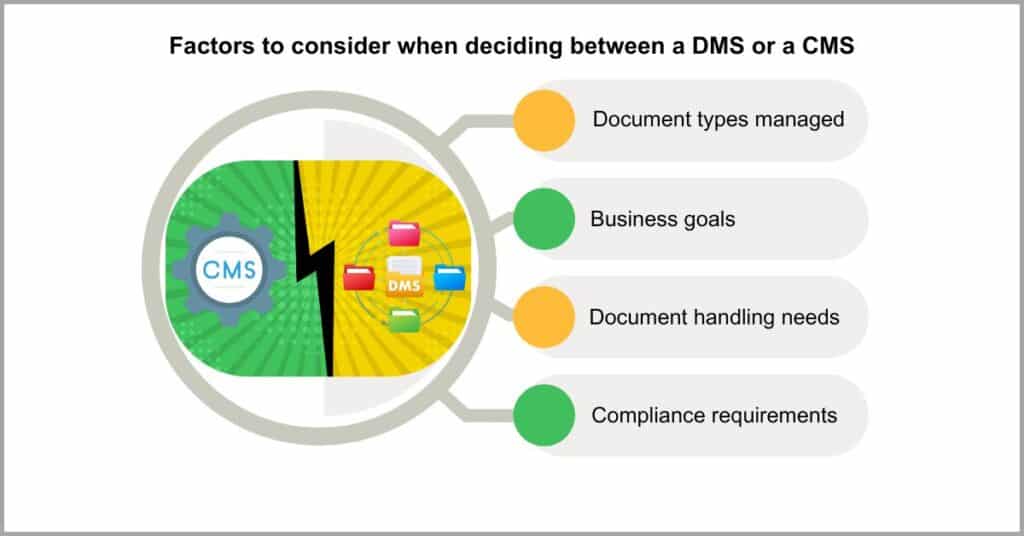
On the other hand, if your small business’s document issues, for the most part, revolve around managing contract documentation, I recommend a contract management tool.
It’s also possible that you may need both systems.
That may be the case if you struggle to manage contracts & other general documents. If you’ve determined that a DMS is the right fit for your business needs, you should consider our software, which makes document management simple and painless.
So why not try FileCenter for free today? Our software offers vital document management features to help streamline your workflow and increase productivity. It also comes with e-signatures and other tools that massively improve contract management.
b) Assess compliance requirements
Your business may operate in a highly regulated field.
If you have huge risk and compliance management needs around tracking contract terms, deadlines, obligations and compliance, you should consider a contract management system, which is purpose-built for this type of risk management.
With a general DMS that lacks vital contract risk management features, your small business may have trouble adhering to contractual compliance requirements.
Alarmingly, 90% of organizations have ineffective and highly fractured contract processes, which elevate contract compliance risks, as per a KPMG study. The right contract management solution can change this to reduce non-compliance risks.
It can help unite disparate workflows so that these issues don’t fly under the radar.
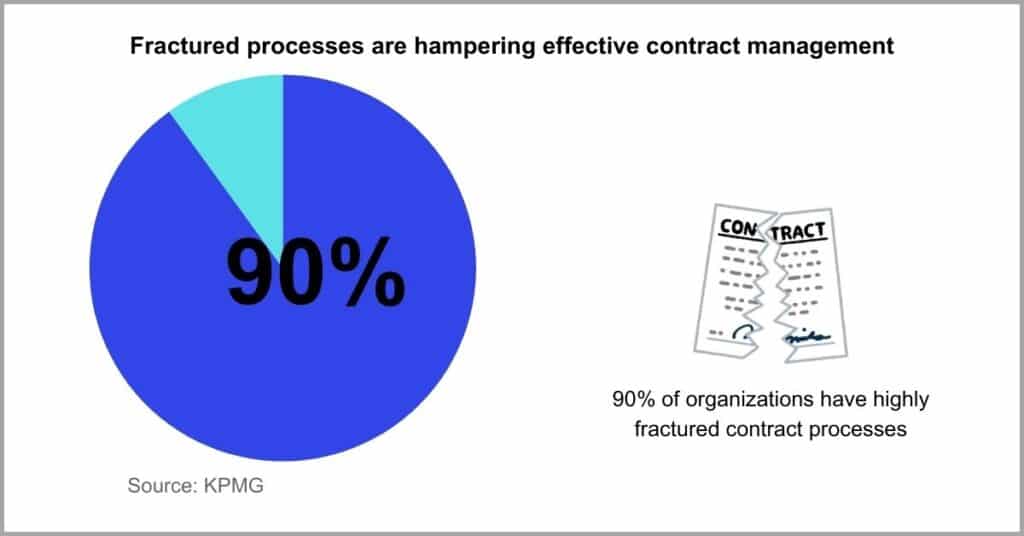
But does this mean a DMS doesn’t help with compliance?
No. In fact, you can massively improve regulatory compliance with a document management software, because they may offer features such as automated retention schedules to help you archive or delete records in time as per industry standards.
That said, a great DMS supports compliance when it comes to general types of documents. This is because it offers version control, audit trails and other features necessary for the compliant handling, collaboration and storage of all types of files.
So a document management system is ideal if you have broader compliance goals, which cover aspects such as industry, tax, data and even corporate compliance.
c) Think about your collaboration needs
Do you often need to collaborate on document work?
When it comes to document management vs contract management tools in terms of collaboration, they support team work in different ways. A CMS is contract workflow specific while a DMS offers more robust version control to support general collaboration.
That said, if your small business has trouble collaborating on document work, you may notice task duplication and delays in approvals & decision making.
A survey by Adobe recently found that at least 88% of staff struggle to collaborate at work. The absence of essential document management technologies and even crucial communication tools were unveiled as some of the biggest issues behind this.
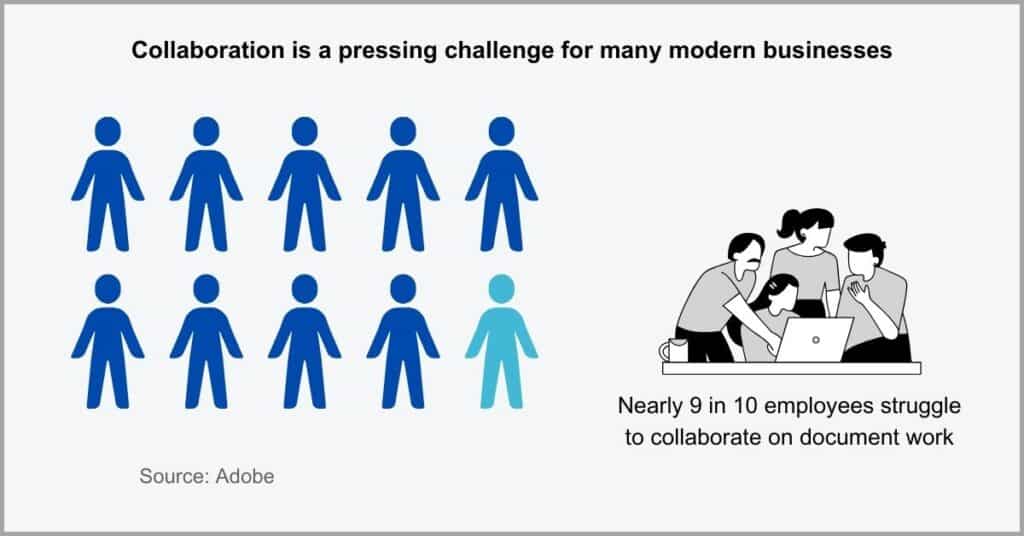
If you need to improve collaboration for general document work across cross-functional teams, I suggest using the best LogicalDOC DMS alternatives, and other document management systems, which enable seamless cross-departmental collaboration.
Conversely, if you’d like to improve collaboration with automated contract-specific workflows in a limited number of departments like HR, legal or finance, you may be better off with a great contract management system which is purpose-built for this task.
It may offer pre-defined contract approval workflows to increase efficiency, complete with alerts for contract deadlines and audits to improve team work.
If you contract document collaboration needs are however not very advanced, then an excellent document management system may be sufficient for your small business.
Conclusion
Your business has unique information handling needs.
This also means you may need specialized technology that addresses these concerns.
If you go with a contract management software when you actually need a DMS, you may get limited document handling that only increases inefficiencies.
Unfortunately, a study by Formstack revealed that 51% of businesses have highly inefficient document management and operational processes. The report further added that these organizations are losing millions of dollars as a result.
Thanks to the key document management vs contract management differences we’ve discovered, you can now choose a tool that best addresses your needs. Speaking of which, I recommend our proven document management software.
Get a one-stop solution and start your free FileCenter trial to manage contracts and other different types of business documents more efficiently.
With our software, you’ll access crucial features that address a wide range of document handling needs and even contract-specific capabilities for better contract management.


